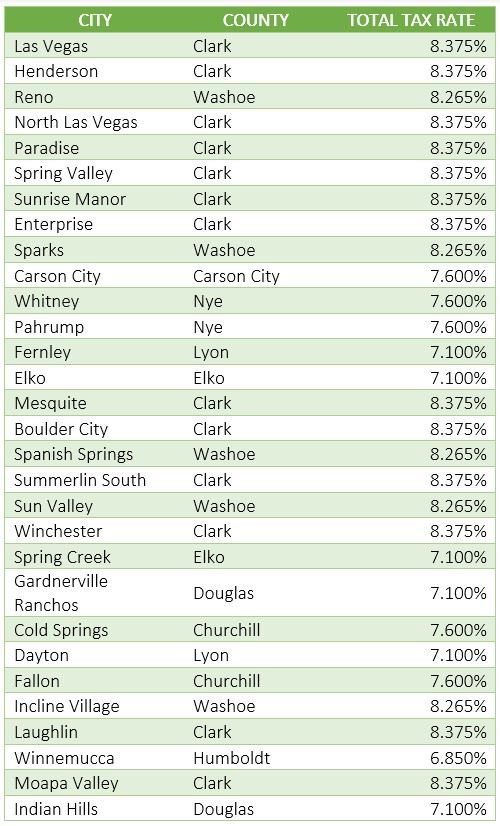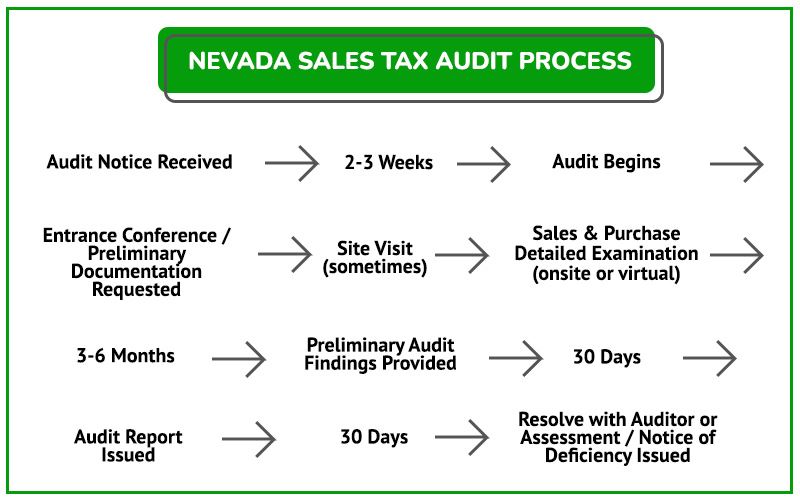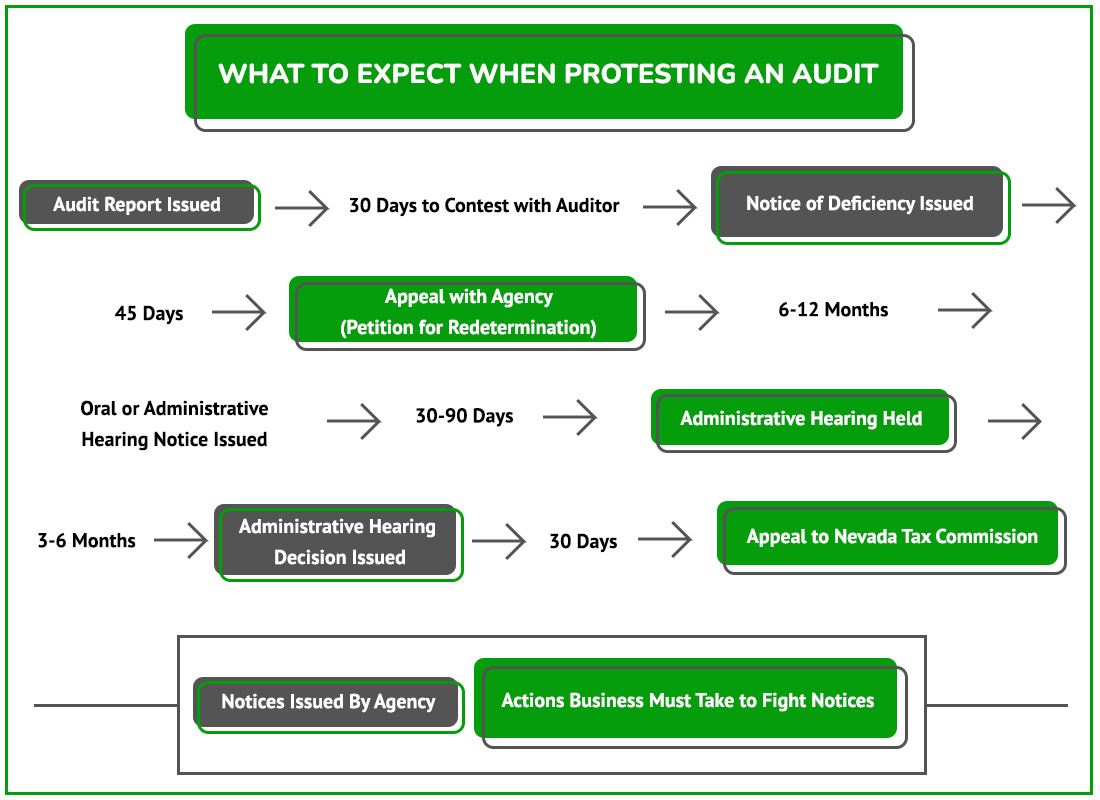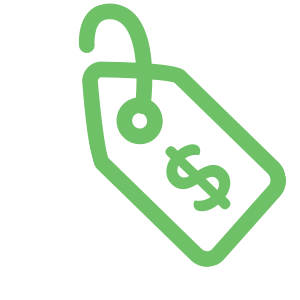
Nevada Sales and Use Tax & Audit Guide
This guide is for businesses that need straightforward answers on the following Nevada Sales and Use Tax subjects:
- Do I need to be collecting Nevada sales tax?
- Should I be collecting or paying Nevada use tax?
- What do I do if I should have been collecting but haven’t?
- I received an audit notice from the Nevada Department of Taxation, what should I do?
- Guidance on fighting a sales tax assessment in Nevada.
Who Needs to Collect Nevada Sales and Use Tax?
To be subject to Nevada sales tax reporting and collection rules, your business must have sufficient nexus in Nevada as well as have sales or property or service subject to Nevada sales tax.
How Is Nexus Established in Nevada?
According to the Nevada Department of Taxation, sales tax nexus is created in Nevada if a business has a physical presence in Nevada, such as:
- Having employees, agents, or independent contractors in Nevada for purposes of taking orders, making sales or deliveries, or installing or assembling tangible personal property in Nevada.
- Maintaining an office or other place of business in Nevada.
- Assembling, installing, servicing, or repairing products in Nevada.
- Owning, renting, or leasing real property or tangible personal property in Nevada, including a computer server in Nevada.
- Delivering goods to Nevada customers using your company-owned or leased truck.
- Maintaining inventory in Nevada using a third-party fulfillment service, such as Fulfilled by Amazon (“FBA”).
Additionally, businesses that do not have a physical presence in Nevada, can establish economic nexus by exceeding a certain annual sales threshold in the state as discussed below.
Economic Nexus (Wayfair Law) And Internet Sales in Nevada
As of October 1, 2018, businesses located outside Nevada may be subject to its sales and use tax laws. Specifically, Nevada’s Wayfair law requires that an out of state business (i.e., one without a physical presence) must register with Nevada Department of Taxation to collect and remit sales and use tax if the business has either of the following in the prior or current year:
- has sales of tangible personal property delivered into Nevada exceeding $100,000, or
- at least 200 separate retail transactions.
Which Sales Are Subject to Nevada Sales Tax?
General Transactions
Nevada sales and use tax will generally apply to your sales in the state unless an item is specifically exempt under Nevada’s statutes or regulations. While many sales tax rules seem straightforward, their application in Nevada can become complicated as new industries, products, and business models arise. We recommend scheduling a time to review your specific situation with one of our sales tax professionals.
Common exemptions from Nevada sales and use tax:
- Groceries / Food products
- Prescription Drugs
- Newspapers & magazines
- Many items used in farming or manufacturing.
Services
Generally, services are not subject to sales tax in Nevada except for fabrication labor in connection with the sale of tangible personal property.
Software
Nevada does not tax software or software as a service (SaaS) unless the software is delivered in a tangible medium.
Shipping & Handling
Nevada has somewhat complicated rules on shipping and handling charges. Shipping charges are not subject to Nevada sales tax if they are separately stated. However, even if separately stated, handling, packaging, and crating in connection with the shipping or delivery charges are taxable.
See Nevada Department of Taxation Sales Tax Information & FAQs for more information.
Determining Local Sales and Use Tax Rates in Nevada
Nevada’s base or statewide sales tax rate is 6.85%. However, most counties charge a local surtax on top of the 6.85%, increasing the total sales tax that must be collected and remitted by the seller. Those local rates can be up to an additional 1.525%.
The local surtax applies if the sale is made within or delivered to a location within the respective county. Local surtaxes are remitted to the state as part of the Nevada sales and use tax return. The combined Nevada + County sales and use tax rates for the largest 30 cities as of January 2020 are listed below. A comprehensive list can be found here.

I Should Have Collected Nevada Sales Tax, But I Didn’t
If you determine your business has nexus but you have not collected Nevada sales tax, the primary options are to:
- Register and pay back taxes, penalties, and interest, or
- File an application for Voluntary Disclosure in Nevada to eliminate penalties (and in some cases reduce your tax liability and avoid interest).
Here is what you need to know about each option to make the best decision for your business:
Option 1: Register to Pay Back Taxes, Penalties, and Interest
Sometimes the best solution for a business is simply to register with Nevada and pay back taxes, penalties, and interest. A VDA is not cost-effective if the past liabilities and penalties are minimal. Nevada has one of the longest lookback periods in the country, which means participation in a VDA may only make sense in extreme circumstances. If you’re unsure what your past liabilities are, contact us and one of our state tax professionals will work with you to conduct an analysis and help you make the right choice for your business.
When to consider registration and payment:
- If you established nexus less than 8 years ago.
- The sales tax penalty is LESS than the professional fees charged for the VDA.
- Your business does NOT have a sales tax collected issue.
Beware: registering does not generally eliminate past liabilities
Option 2: Voluntary Disclosure Agreement (VDA)
Nevada’s VDA lookback period: 8 years
In many situations, voluntary disclosures are a useful tool to reduce extended periods of past exposure. For example, if you should have been collecting sales tax for 10 years, the voluntary disclosure limits the lookback period to 8 years. As a result, the benefit of doing a VDA often turns on:
- Whether the VDA limits lookback period. (i.e., you established nexus more than 8 years ago.)
- The sales tax penalty savings is MORE than the professional fees charged for the VDA.
- You have a sales tax collected but not remitted issue.
I Received a Nevada Sales and Use Tax Audit Notice, What Should I Do?
Nevada regularly audits local and out-of-state businesses that need to charge, collect, and remit various taxes in Nevada. Businesses that receive a sale and use tax audit notice should consider the following:
- Prior experience and expertise to handle a Nevada sale and use tax audit. How can you trust that the state’s auditor is abiding by the rules and following proper procedure?
- How will you know when to provide documents or when to push back?
- Do you have a thorough understanding of your sales and use tax areas of exposure?
- Controlling the audit is paramount to the limiting exposure and shaping the results. Are you confident in doing that on your own?
If you are unsure of the answer to these questions and you do not have experience handling Nevada sales tax audits, hiring a professional might be right for you.
Contact us and learn how our sales tax professionals can give you the peace-of-mind and confidence you need during your audit. Additionally, these resource pages are full of detailed information to help you evaluate critical decisions before and during your Nevada sales and use tax audit.
- The Audit Overview & Selection Process
- The General Audit Process
- Statute of Limitations Extensions & Issues
- Managing the Sales Tax Auditor
Nevada Sales Tax Audit Process
Nevada sales and use tax audits usually follow the process laid out in the following flowchart. See the detailed guidance for each stage of the process in the sections below.

What to Expect After You Receive a Nevada Sales and Use Tax Audit Notice
Many audits begin with an unexpected call from a Department of Taxation sales tax auditor. Shortly after the call, your business will receive an audit notice confirming that your business was selected for a (field or desk) Nevada sales and use tax audit. To help prepare for the audit, we highly recommend you start by getting a state and local tax professional involved.
What to Expect From A Nevada Sales Tax Auditor
- Auditor will conduct initial review of available records.
- Auditor will often schedule and perform an entrance conference. You can provide input on when and where to hold the audit meeting based on what is convenient for you.
- Records will be requested (e.g., sale journals, bank statements, purchase invoices, resale certificates, etc.).
- Usually, the auditor will tell you that, as part of the audit, they are looking for any areas where your business is entitled to a sales tax refund. While it is technically their job to look for this, they very seldom (if ever) do.
What to Expect During The Audit
Once the necessary records are received, the auditor will:
- Conduct the sales tax audit by comparing your Nevada sales and use tax returns to your federal income tax returns or bank statements to determine whether all applicable sales, or gross sales, were reported on your Nevada sales tax return(s).
NOTE:A slight error in how tax was charged on even a single type of transaction, when multiplied over three years, can add up to a considerable sales tax liability.
- Once the auditor is confident all sales are accounted for, they will review your exempt and out-of-state sales.
- Conduct a use tax audit – the auditor will request a detail of certain documents / accounts to make sure use tax was properly paid on applicable purchases. Common purchases audited for payment of Nevada use tax could include:
- Advertising Expense
- Auto & Truck Expense
- Repair and Maintenance
- Rent (including related party rent)
- Office Expense
- Miscellaneous Expense
- Supplies
- Equipment
Despite publications to the contrary, if a business buys an item online without paying use tax, the business still has an obligation to remit the tax to Nevada. This often leads to unexpected use tax assessment for the unsuspecting taxpayer after an audit.
After the Audit – Understand and Defend Your Businesses Rights
Upon completion of the audit, there will usually be an exit conference with the auditor. The auditor will produce an audit report with corresponding workpapers to support the Nevada sales and use tax deficiency assessment.
We recommend businesses refrain from agreeing to the sales tax assessment until a sales tax professional has reviewed it for issues that should be challenged. Many businesses wind up drastically overpaying the state because the business owner or in-house accounting personnel were not well versed in the sales tax laws that, if challenged, could have reduced their Nevada sales tax liability.
Next, we’ll cover the process of challenging a Nevada sales tax audit assessment.
Nevada Sales Tax Audit Protest Process Flow Chart

Contesting Audit Findings with the Auditor
Any issues with the results of the audit are handled as follows:
- Auditee has 30 days to initially contest findings with the auditor in charge of your case or their supervisor.
- Documentational issues (exemption certificates, proof tax was paid, etc.) and calculations are worth addressing with the auditor.
- Legal interpretations of sales tax law are often not resolvable at this stage.
- If a resolution cannot be reached with the auditor, the next step is to appeal/protest the issue with the Nevada Department of Taxation.
Appeal / Protest to the Nevada Department of Taxation
Any contested issues that were unresolved prior to the Notice of Deficiency being issued can be protested though Nevada’s petition for Re-determination process.
- A petition for redetermination must be done within 45 days of the Notice of Deficiency (NOD) issuance.
- If you miss the 45 days, you may lose your valuable appeal rights.
If you have received a Notice of Deficiency and have not at least talked to someone experienced in Nevada State and Local tax, now is the time before these deadlines are missed.
Nevada Sales Tax Administrative Hearing
After the Petition for Redetermination, if there are factual or legal disputes, the Department will refer the case for an evidentiary hearing called, an administrative hearing. The administrative hearing is presented to a neutral administrative law judge (ALJ). The ALJ will issue a decision within 60 days after the hearing. Our team has successfully handled hundreds of administrative court cases and can help your company receive the resolution it is entitled to. It is very similar to a court hearing and having an experienced representative is imperative.
Settling a Nevada Sales Tax Liability
Along the way, or even after one the critical notices are issued, there is the possibility to settle your Nevada sales tax case by negotiating with Nevada Department of Taxation through a Request for Offer in Compromise. This allows you and the Department of Taxation to mutually agree on an assessment less than what is owed due to doubts about the actual liability or the ability to collect. The Department also considers overall equity and fairness in weighing an offer in compromise.
If you or your professional seldom does state and local tax work, it might be difficult to evaluate fair versus unreasonable settlements. DO NOT try to negotiate a settlement without an experienced Nevada state and local tax lawyer or professional.
Contest a Nevada Jeopardy Assessment
Nevada may issue a Notice of Jeopardy Determination in certain situations. The jeopardy assessment gives the Nevada Department of Taxation accelerated rights and it may immediately begin to try and collect. Due to the jeopardy nature, the taxpayer only has a short period of time to contest the assessment and must place a security deposit to fight the issue.
Nevada Tax Commission
If you still cannot get your audit resolved and you do not agree with the ALJ’s decision during the redetermination phase, you have 30 days to file a notice of appeal with the Nevada Tax Commission. The Nevada Tax Commission is a committee of eight citizens designed to oversee the Department of Taxation.
While it is another appeal opportunity, the tax commissions review authority is limited. To appeal, you must show the ALJ decision was:
- In violation of constitutional or statutory provisions.
- More than the statutory authority of the agency.
- Made upon unlawful procedure.
- Affected by other error of law.
- Clearly erroneous in view of the reliable, probative, and substantial evidence on the whole record.
- Arbitrary or capricious or characterized by abuse of discretion.
Therefore, it is critical to put forth your best case during the administrative hearing process because a Tax Commission decision reversal can be incredibly difficult.
Other Nevada Sales Tax Resources
Reviews

-
"Take Control of your sales tax with easy-to-use DIY tools. Get the guidance you need - without the high cost of full-service support."
Meet David, the Auto Repair Shop Owner (DIY)
- The DIY Business Owner -
"Get expert answers when you need them. Our on-demand consulting service connects you with tax professionals for quick, reliable advice—without long-term commitments."
Meet Mark, the Business Owner Who Needs Quick Answers
- The On-Demand Consultant User -
"Outsource your sales tax headaches to proven experts. Our full-service solutions handle compliance, audits, and dispute resolution—so you can focus on growing your business."
Meet Greg, the CFO of a Multi-State Manufacturing Company
- The Managed/Enterprise CFO -
"Stay in control while getting expert help when you need it. Our guided sales tax solutions give you access to professionals for compliance, audits, and appeals—without the cost of full-service management."
Meet Kris, the Multi-Store Gas Station & Convenience Operator: Multi-Location Owner (Guided Support)
- The Guided Business Owner -
"Jerry is the best!"
Jerry is the best! I made the mistake thinking I could deal with the use tax auditor on my own not realizing that I would be ...
- Gary O. -
"Sales Tax Helper Can Make Miracles Happen"
Sales Tax Helper can make miracles happen. Jerry was able to wipe hundreds of thousands of dollars off a NY sales tax bill ...
- Zalmi D. -
"I Will Definitely Be Using His Services Again"
Jerry was very helpful and listened to all our concerns. I will definitely be using his services again.
- Joyce J. -
"Representing Our Company Professionally"
Owning a Texas car dealership is demanding work, so taking on a Texas Sales Tax Audit was a daunting task for us – we didn’t ...
- Ata A.
